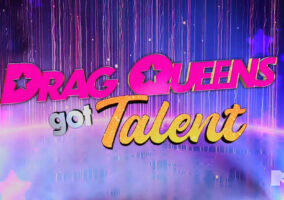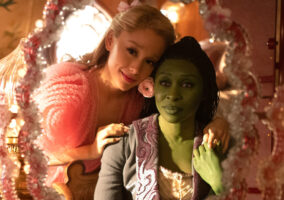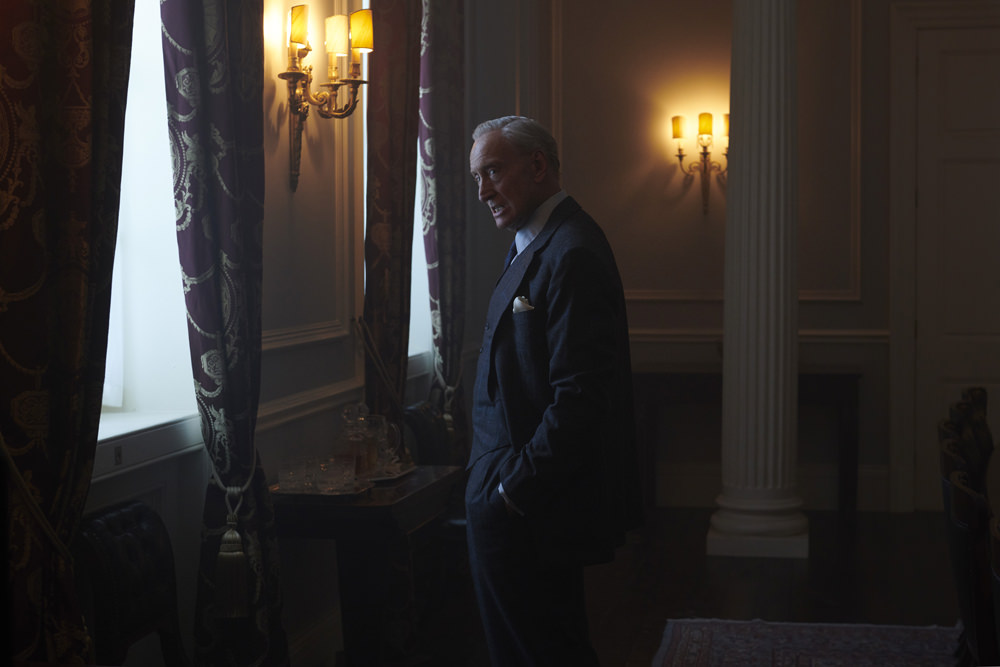
As we noted in the last set of reviews, Peter Morgan, creator and lead writer of The Crown, is astonishingly good at wringing real, resonant human drama out of the Windsors – Elizabeth especially – by having them react emotionally to the historic events that happen around them. Nothing new is said about Elizabeth in this episode, which has been true of pretty much the entire first half of this season. This not a failing on the show’s part because once you establish the themes and issues of a real person’s story, especially when you know how long that story continues to go on, you really don’t have much choice but to constantly restate them. Elizabeth, as a character in a drama and as the sovereign of a nation, and as someone who is still alive over a half-century after these events, cannot by definition progress. Elizabeth is dutiful. Elizabeth is stoic. Elizabeth is reliable. Elizabeth does not relish her role. It’s been said and re-said.
That does not, however, make it unworthy of restating. While the idea that Elizabeth doesn’t love her role is not new, Olivia Colman does absolutely wonderful things with it. When she notes to Porchie how much she loves horse breeding and how good she is at it, she says, “I actually think it’s what I was born to do – until the Other Thing came along, which somebody else was born to do and they elected not to.” It’s a lovely line, perfectly delivered. And it sums up Morgan’s version of the Queen exactly: dutiful, stolid, resentful and wistful all at once. To be fair, there’s not just a lifelong resentment of being shoved into her role, but there’s also the idea that never leaves the back of Elizabeth’s mind; the idea that she truly isn’t the person who should be doing the job. That’s some epic imposter syndrome for someone who is supposed to believe on some level that God himself appointed her. At moments like these, Colman’s tendency to play Elizabeth in a more ingratiating manner than Claire Foy really pays off.
The show likes to dance around the idea of an affair – if not of the body then of the heart – between Elizabeth and Porchie, but at the same time, an episode like this one shows her far more in love with the idea of a life away from the palace. The only things she stared lovingly at were a succession of horses, not Porchie. There’s a hint of an infatuation on his part, which she likes to indulge because he’s pleasant and she likes the kind of life he represents; the kind of life she could have had. But even then, it never quite feels romantic on his part; more like a deep friendship of shared interests complicated by the extreme distinction of her royal role, which forces him to be deferential to her in a way that could be mistaken for something more emotional. And while we admit a good deal of all that is interpretation on our part, we think the final scene between Elizabeth and Philip in this episode seals the deal on where Elizabeth’s heart lies and how Philip doesn’t truly see Porchie as a threat. It was a charming scene between Colman and Menzies, ending with a Damn Good Kiss that shows just how much Elizabeth and Philip adore each other. It’s wonderful to see the depiction of a healthy mature marriage -not that Morgan has much choice in the matter, given what we know about how unshakeable that marriage turned out to be. Still, the way she leans back and then leans into him as they kiss; so intimate and emotionally bare. Wonderful work there by Colman. She’s not the only one who knocked it out of the park this episode.
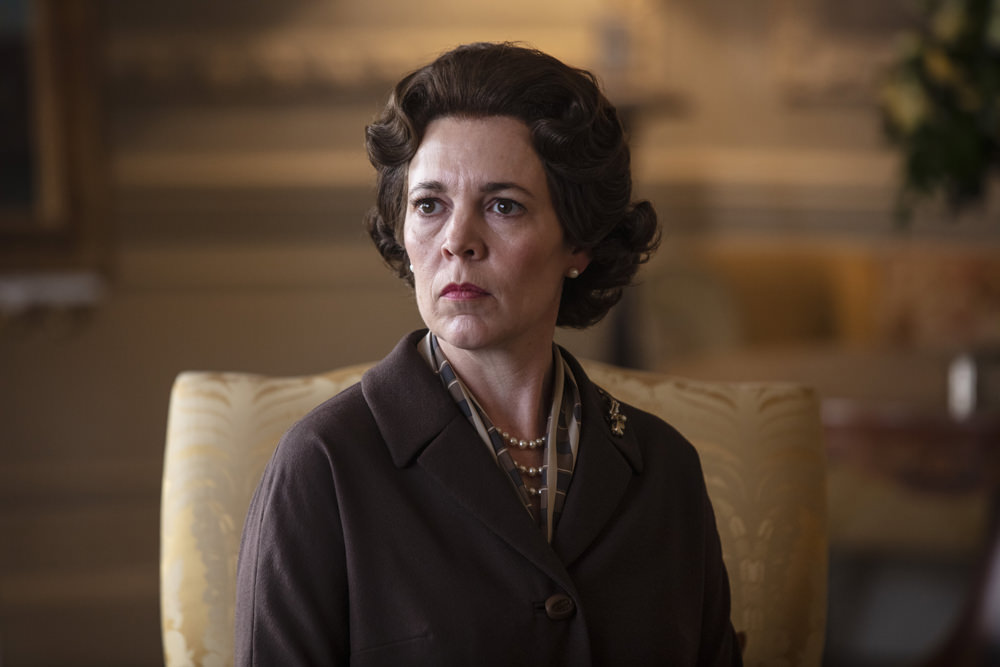
Charles Dance, stepping into Greg Wise’s well-polished shoes to play Dickie Mountbatten, is simply spectacular in the scene where Harold Wilson fires him, doing so much with dialogue that consists of no more than “Well. There we are then.” It’s a very specific kind of rage that comes from very privileged men finding themselves in situations that they are smart enough to realize are not going to go their way no matter how much they bluster – and it’s the kind of thing Dance excels at. The menace in that second “There we are then” is positively chilling. Of course it’s a bit difficult to look at Charles Dance scheming and plotting and reacting with tremendous frustration toward his family without thinking of Tywin Lannister, but them’s the breaks when you happen to be very good at playing aristocratic assholes.
While the story of the attempted coup didn’t much hold our attention ( waaaaaay too much time spent on Mountbatten recalling the glories of the Empire or Mountbatten being serenaded as he left his post), seeing as how there clearly was no attempted coup in Great Britain in the 1960s, but Dance is great in the role and it allowed for fantastic and long overdue scenes like Colman turning off the charm and leaning into the Ice Queen persona. “Did you get a dressing down from our doughty queen?” The exchange between Dickie and his sister Princess Alice about getting old, becoming a bystander, and learning to stay out of the way – another absolute delight. Another chance for Jane Lapotaire to put her spin on this singular, fascinating character. “Oh. Who cares, honestly?” she asks Dickie rhetorically when he complains about the state of the world. “One of the great things about being as old as we are is that it’s not our problem.”
That line from Princess Alice may just have served as something of a thematic umbrella over the entire season. It certainly made the perfect lead-in to the next episode, “Tywysog Cymru,” in which the next generation of The Crown takes center stage for the first time. It’ll be interesting to see how the show handles the role of Charles in the future (especially the Diana years), but this episode proved to us that it’s off to a good start.
Part of the reason for that is of course Josh O’Connor’s fantastic work portraying the young Prince of Wales, nailing Charles’ voice and mannerisms perfectly. His charm and insecurity come through, but so does his privilege, self-absorption and tendency to whine. O’Connor threads the needle perfectly on portraying the emotional immaturity and social awkwardness of Charles while at the same time giving the surrounding characters good reason to be annoyed, impatient, or outright angry with his behavior. O’Connor and the similarly well-cast Erin Doherty do a fantastic job depicting the weirdness and affection of Charles’ relationship with Princess Anne; the way she teases him and understands his point of view but in very Windsor-like fashion, does nothing to buck him up or defend him, partially because, like Aunt Margaret, she thinks she’d be better at his future job than he’d be. He’s on his own in that family. They all are.
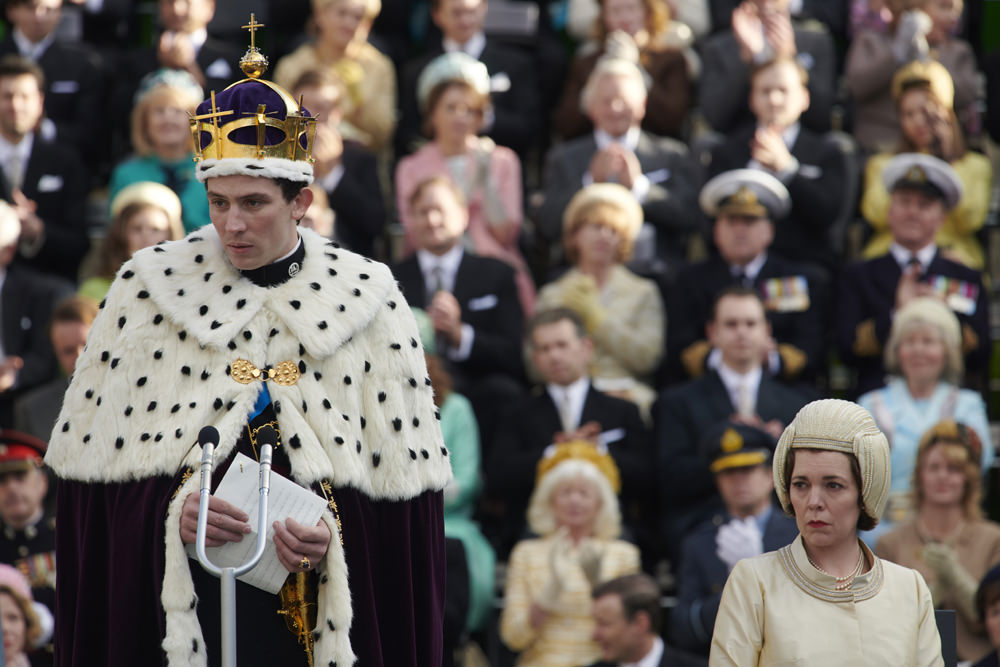
One of the very best things about The Crown is the commitment to casting the truly great actors for even the one-off roles. Continuing in that tradition, Mark Lewis Jones as Charles’ reluctant teacher and ardent Welsh nationalist Edward Millward is simply perfect here. He’s got such an actor’s face; so expressive and movable, managing that trick only really good actors can do: deploying a wide open expression that encourages you to look at him while wondering exactly what he’s thinking or going to do. That meaty, weathered face, screwed up in anxiety and despair when informed of the university’s plans for him, staring in exasperation at the lithe and youthful Charles acting like a jackass, softening as he starts to understand the Prince’s rather singular set of issues, and finally beaming with true affection as his student excels his expectations. Mark Lewis Jones’ work here made him a perfect avatar not only for Welsh identity, but for someone who understands the richness of language and the importance it holds to a nation of its speakers.
To be honest, we were slightly annoyed with Charles for making Wales’ national identity related to his own family problems, although that was probably by design (and a likely and common reading of his investiture speech, to boot). First, it’s very in-character for this show to depict the royals as truly believing they are the embodiment of the people; for someone like Charles to see no problem relating the feelings of an entire nation toward their identity, their language, and their independence after centuries of having to defer to the Crown to his own inability to get Mummy to pay attention to him. While the portrayal of Charles in The Crown has been extremely sympathetic (we predict Peter Morgan’s recounting of the particulars of his first marriage next season is going to piss off the Diana fans), the scene with his mother at the end of the episode was clearly meant to show her as the one in the right, even if she’s cold and unloving about it. Colman was again great in this scene – as she is every time the script asks her to bring herself up to her full, haughty, stone-faced Elizabethness.
Morgan has reiterated the idea again and again – starting with the very scene Elizabeth references from season one with her grandmother – that the sovereign must remain neutral, stolid, steadfast and inscrutable – and that anyone who thinks otherwise, from Uncle David to Margaret to Philip, has been shown time and again to be in the wrong. The tag line uttered by Eileen Atkins as Queen Mary in season one, “The Crown wins. The Crown always wins,” has been the one over-arching, unshakable theme of the series. And in this case, like the Elizabeth and Philip marriage, history once again underlines how the themes on the show are playing out. While it’s easy to sympathize with a young man who feels unheard and unloved, it’s hard not to think of how Charles’ life played out and consider O’Connor to be playing him as just a bit delusional and self-absorbed.
Dwayne Johnson, Kevin Hart , Karen Gillan, Jack Black and Awkwafina at the “Jumanji: The Next Level” Mexico Photo Call Next Post:
2019 American Music Awards Red Carpet Rundown
Please review our Community Guidelines before posting a comment. Thank you!

